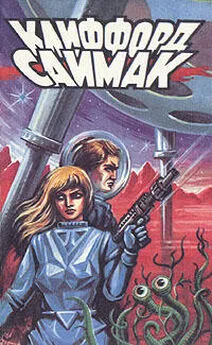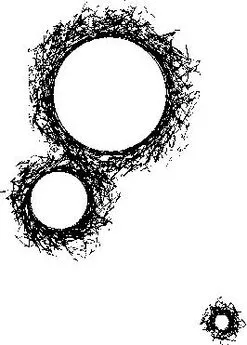Клиффорд Саймак - Роковая кукла - английский и русский параллельные тексты
- Название:Роковая кукла - английский и русский параллельные тексты
- Автор:
- Жанр:
- Издательство:неизвестно
- Год:неизвестен
- ISBN:нет данных
- Рейтинг:
- Избранное:Добавить в избранное
-
Отзывы:
-
Ваша оценка:
Клиффорд Саймак - Роковая кукла - английский и русский параллельные тексты краткое содержание
Роковая кукла - английский и русский параллельные тексты - читать онлайн бесплатно ознакомительный отрывок
Интервал:
Закладка:
The surface of it powdered slightly at the pressure of my fingers, but it did not break.
It was slightly curved and white, a ghostly, chalky white.
Turning it over in my hand, I made out that it was a rib bone and the shape and size of it was such that it could be human, although my knowledge was too slight to be absolutely sure. If it were really humanoid, I told myself, then it meant that at one time a thing like man had lived here. And could it mean that something very similar to the human race still resided here?
Когда я сжал ее, пальцы мои словно пылью покрылись — верхний слой изъело время, — но сама кость не сломалась.
Чуть изогнутая и призрачно белая, белая как мел.
Я повертел ее в руках: похоже, что это ребро, и, может быть, судя во форме и размеру, человеческое, — впрочем, тут моих знаний не хватает, могу и ошибиться.
Если эта кость и вправду сходна с человеческой, значит, когда-то здесь жили существа, напоминающие людей. Но тогда, может быть, здесь и поныне обитает какое-то подобие человечества?
A planet full of flowers with nothing living on it except the purple flowers, and more lately Tupper Tyler. That was what I'd thought when I had seen the flowers spreading to the far horizons, but it had been supposition only. It was a conclusion I had jumped to without too much evidence. Although it was in part supported by the seeming fact that nothing else existed in this particular place—no birds, no insects or animals, not a thing at all, except perhaps some bacteria and viruses and even these, I thought, might be essential to the well-being of the Flowers.
Планета, населенная цветами... никакой иной жизни — только лиловые цветы да в последние годы Таппер Тайлер. Так подумал я сначала, увидав море цветов, расплескавшееся до самого горизонта, но это был только домысел. Не успев путем разобраться, я поспешил с выводами. Отчасти их подкрепляло то, что я увидел: здесь, на этом клочке земли, и в самом деле нет больше ничего живого — ни птиц, ни зверей, ни насекомых, разве что какие-нибудь бактерии, вирусы, да и то, вероятно, лишь такие, которые полезны Цветам.
Although the outer surface of the bone had chalked off when I picked it up, it seemed sound in structure. Not too long ago, I knew, it had been a part of a living thing. Its age probably would depend to a large extent upon the composition and the moistness of the soil and probably many other factors. It was a problem for an expert and I was no expert.
Хотя верхний слой кости под пальцами обращался в меловую пыль, сама кость, видимо, была очень крепкая. Не так уж давно это была часть живого существа. Чтобы определить ее возраст, наверно, надо знать состав и влажность почвы и еще многое. Это задача специалистов, а я не специалист.
Now I saw something else, a little spot of whiteness just to the right of me. It could have been a white stone lying on the ground, but even as I looked at it I didn't think it was. It had that same chalky whiteness of the rib I had picked up.
I moved over to it and as I bent above it I could see it was no stone. I let the rib drop from my fingers and began to dig.
The soil was loose and sandy and although I had no tools, my fingers served the purpose.
Потом я заметил справа еще одно белое пятнышко. Конечно, это мог быть и просто белый камень, но я с первого взгляда решил иначе. В глаза бросалась та же меловая белизна, что и у ребра — моей первой находки.
Я осторожно передвинулся вправо и, уже наклоняясь, увидел, что это не камень. Я отложил ребро и стал копать. Почва рыхлая, песчаная, можно обойтись и без лопаты, собственными руками.
As I dug, the bone began to reveal its shape and in a moment I knew it was a skull—and only a little later that it was a human skull.
I dug it loose and lifted it and while I might have failed to identify the rib, there was no mistaking this.
I hunkered on the slope and felt pity well inside of me, pity for this creature that once had lived and died—and a growing fear, as well.
Кость оказалась округлой, через минуту я понял: это череп, а еще через минуту — что череп человеческий.
Я откопал его, поднял — и если с ребром я еще мог ошибиться, то теперь сомнений не было.
Я был подавлен, меня захлестнула жалость: вот он когда-то жил, и его больше нет... и еще мне стало страшно.
For by the evidence of the skull I held within my hands, I knew for a certainty that this was not the home world of the Flowers. This was—this must be a world that they had conquered, or at least had taken over. They might, indeed, I thought, be very far in time from that old home where another race (by their description of it, a non-human race) had trained them to intelligence.
Ведь этот череп у меня в руках — бесспорное доказательство, что Земля эта не всегда принадлежала Цветам. Их родина не здесь... должно быть, они завоевали этот мир... так или иначе, он перешел к ним от кого-то другого. Да, очень возможно, что они переселились во времени очень далеко от той Земли, где иное племя — по их описанию, племя, нисколько не похожее на людей, — научило их мыслить.
How far back, I wondered, lay the homeland of the Flowers? How many conquered earths lay between this world and the one where they had risen? How many other earths lay empty, swept clean of any life that might compete with the Flowers?
And that other race, the race that had raised and elevated them above their vegetable existence where was that old race today?
Как далеко в прошлом лежит она, родина Цветов? Сколько еще Земель завоевали они на пути сюда, в этот мир из того неведомого, который был их колыбелью? Сколько миров осталось позади, опустошенных, очищенных от всего живого, что могло соперничать с этими Цветами...
А те, кто обучил и возвысил простые растения, кто наделил их разумом, — где они теперь, что с ними сталось?
I put the skull back into the hole from which I'd taken it. Carefully, I brushed back the sand and dirt until it was covered once again, this time entirely covered, with no part of it showing. I would have liked to take it back to camp with me so I could have a better look at it. But I knew I couldn't, for Tupper must not know what I had found. His mind was an open book to his friends the Flowers, and I was sure mine wasn't, for they had had to use the telephone to get in touch with me. So long as I told Tupper nothing, the Flowers would never know that I had found the skull. There was the possibility, of course, that they already knew, that they had the sense of sight, or perhaps some other sense that was as good as sight. But I doubted that they had; there was so far no evidence they had. The best bet was that they were mental symbionts, that they had no awareness beyond the awareness they shared with minds in other kinds of life.
Я положил череп обратно в яму, откуда его извлек. Снова осторожно засыпал его песком и землей — так, что больше уже ничего не было видно. Хорошо бы взять его с собой и внизу, на берегу, получше разглядеть. Но нельзя: Таппер не должен знать о моей находке. Его друзья Цветы с легкостью читают его мысли, а мои мысли для них — книга за семью печатями, иначе зачем бы им для переговоров со мной понадобился телефон. Значит, пока я ничего не скажу Тапперу, Цветы не узнают, что я нашел этот череп. Впрочем, быть может, они уже знают, быть может, они умеют видеть или обладают еще каким-нибудь чувством, которое заменяет им зрение. Но нет, вряд ли: ничего такого пока не заметно. Вернее всего, они способны к умственному симбиозу и знают только то, что им открылось в мыслях других разумных существ.
I worked my way around and down the mound and along the way I found other blocks of stone. It was becoming evident to me that at some other time a building had stood upon this site. A city, I wondered, or a town? Although whatever form it might have taken, it had been a dwelling place.
I reached the creek at the far end of the mound, where it ran close against the cutbank it had chewed out of the mound, and started wading back to the place where I had crossed.
Я спустился с насыпи, обогнул ее и по дороге нашел еще много каменных плит. Несомненно, когда-то на этом месте стояло здание. А может быть, тут был поселок или даже город? Так или иначе, здесь жили люди.
Я вышел на берег у дальнего конца насыпи, где ручей бежал вдоль нее вплотную, подмывая крутой склон, — и зашлепал по воде к тому месту, где раньше переходил вброд.
The sun had set and with it had gone the diamond sparkle of the water. The creek ran dark and tawny in the shadow of the first twilight.
Teeth grinned at me out of the blackness of the bank that rose above the stream, and I stopped dead, staring at that row of snaggled teeth and the whiteness of the bone that arched above them. The water, tugging at my ankles, growled a little at me and I shivered in the chill that swept down from the darkening hills.
Читать дальшеИнтервал:
Закладка:


